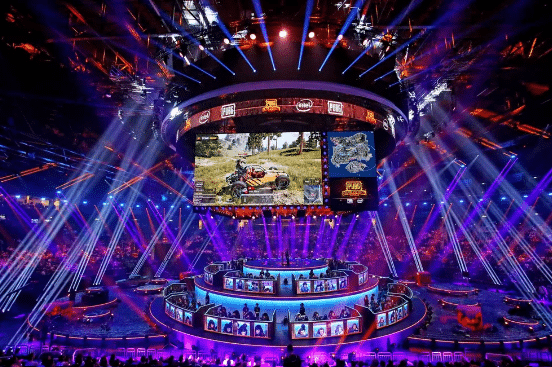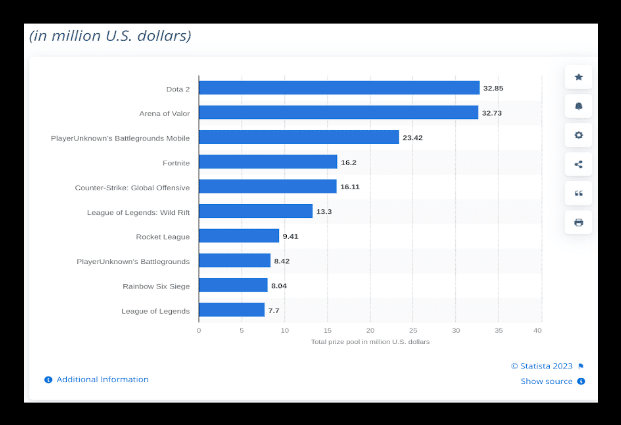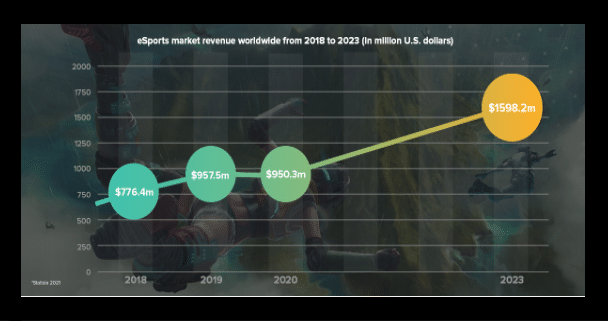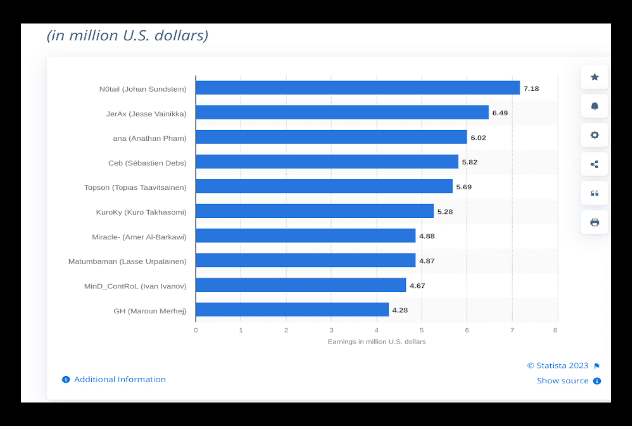- 5 minute read
Fifty years ago, Stanford University hosted the first video game competition. Students were invited to watch an “intergalactic space war Olympics” and the winner received a year’s subscription of Rolling Stone Magazine. Five decades later, eSports has grown into a $1+ billion industry.

Today’s eSports events are exciting multiplayer online battles (MOBA), first-person shooter (FPS) and real-time strategy (RTS) games; international tournaments that attract over 285 million frequent viewers of eSports worldwide. Gamers have gone pro and streaming has been the main driver that transformed eSports event organizers into powerful media conglomerates. Major gaming hardware and accessory companies, energy drinks, Telecoms and ISPs sponsor these events. According to Newzoo, eSports event sponsors generated $837.3 million in revenue in 2022 and prize pools also run in the millions.
Leading eSports games worldwide in 2022, by cumulative tournament prize pool

Thousands of e-Sports professionals worldwide make a great living out of sponsorships, merchandising, investment, game developers’ and league payments. Gaming stars earn millions of dollars.
In 2022, the eSports game with the greatest tournament prize pool was Dota 2, exhibiting a cumulative prize pool valued at $32.85 million, just a little higher than the runner up, Arena of Valor, which had a cumulative prize pool of $32.73. Dota 2 is a multiplayer online battle arena video game (MOBA) developed by Valve Software which developed ‘Defense of the Ancients,’ and ‘Warcraft III: Reign of Chaos.’ Today’s gaming teams and their pros have become brands, very much like NBA, FIFA Worldcup, Tennis Grand Slam and NFL stars.

Asia-Pacific (APAC), North America, and Europe are the top three esports markets. China, Japan, and South Korea dominate the APAC region, with the US, Germany and the UK following in its trail. Insider Intelligence estimates esports viewers in the US will total 29.8 million in 2022—eventually climbing to 34.8 million in 2026.
In the USA, revenue in the eSports market is projected to reach $317.00 million in 2023 at a 7.42% annual growth rate, resulting in a projected market volume of $422.10 million by 2027. The market’s largest segment is Sponsorship & Advertising with a market volume of $180.80m in 2023.
Chinese gaming companies expand into mature and emerging markets (Southeast Asia, LATAM and the Middle East). China recognized esports as an official medal event at the 2022 Asian Games in Hangzhou, while imposing stricter rules and regulations on game operators, such as real-name authentication and tight restrictions on minors’ game time. Notwithstanding these measures in the world’s largest market,
Chinese gaming companies expand into mature and emerging markets (Southeast Asia, LATAM and the Middle East). China recognized esports as an official medal event at the 2022 Asian Games in Hangzhou, while imposing stricter rules and regulations on game operators, such as real-name authentication and tight restrictions on minors’ game time. Notwithstanding these measures in the world’s largest market, StratView Research estimates that the global Esports Market will reach US$ 9.1 Billion in 2028, growing at a CAGR of 22.5% during 2022- 2028.
E-Sports and Payments, a Complex Ecosystem
E-sports has become a big business and involves a complex web of incoming and outbound transactions between international vendors, event organizers, publishers, streamers, sponsors, teams, and individual gamers, often located in different regions of the world. Cross-border payments are made through Invoices, direct bank transfers, digital wallets, cryptocurrencies, PayPal as well as via card payments across different jurisdictions and preferred payment methods.
Fans are located all over the world and teams are made up of gamers who are based in different countries. Thousands of gamers across the globe could take part in an eSports event and players could win everything from $25 during a weekly online tournament up to $1 million during a world championship. Imagine a winning Team of players that must get paid out $1,000,000 in prize money, split amongst gamers from Germany, Canada, the Netherlands, South Korea and the US. eESports stars worldwide earn millions of dollars.
The conversion of prize money to local currency can increase the cost of the overall payout process, as tournaments are held across regions, and players will often compete globally. These are no standard B2B, B2C or P2P transactions, but purchases and split pay-outs (prize money) across different legal jurisdictions, during and after each eSports event.
With players located in distinct locations, this requires knowledge and understanding of local compliance rules, tax laws and the correct implementation of due diligence programs. Most Payment Service Providers know how to process payments on behalf of merchants, but e-Sports and professional gaming demands expertise in both cross-border inbound and outbound payouts.
Just to get an idea of the amounts we are talking about, let us have a closer look at overall earnings of the world’s top eSports gamers:
Leading eSports players worldwide as of February 2023, by overall earnings

There is a growing need for secure and frictionless payments in this billion-dollar business. The identity of anonymous gamers with aliases and avatars must be verified through KYC/AML onboarding programs before they can receive their prize fees. International teams have an excited fan base that watches their stars play. They want to be able to buy merchandise during live events, in their local currency while using their preferred payment method. Digital payment preferences differ in each country. This requires partnership with a payment facilitator with a deeper understanding of the international gaming market and of all the risks involved in cross-border transactions and recurring payments. Large sums of money are being transferred and all stakeholders must be protected against fraud.
e-Sports Payment Business Needs
- Secure and frictionless cross-border payments
- Smart payment routing to minimize transaction fees
- Declined transactions recovery
- Local payment methods in multiple currencies
- Legal Compliance Advice
- Fast and secure onboarding (KYC and KYB)
- Integrated risk management solutions to prevent chargebacks
- Risk-based fraud protection
- Process transactions to players, payees, and beneficiaries in in multiple payment methods
- Tax Reporting
- Expertise in subscription models
- Expertise in distributed (split) pay-outs
Yet another aspect of the e-Sports business that is often overlooked is that e-commerce during eSports events is extremely time sensitive. Merchants must be ready for sales peaks during live streaming and a few seconds of downtime might cost them thousands of dollars’ worth of lost revenue. A secure, global payment processor minimized such risks.
Event organizers not only have to provide their stakeholders with payment methods in multiple currencies to maximize conversion rates, but millions of viewers are tempted to subscribe to get access to exclusive eSports content. Such subscription models ask for a payment facilitator that specializes in secure, recurring billing options. Sometimes age restrictions apply on specific games, which require additional age verification solutions in compliance with local legislation.
Want to learn more about eSports and Secure Cross-Border Payments?
To say that the eSports payments ecosystem is a little complex seems to be an understatement. This business needs to partner with an experienced and fearless global payment processor. If you are into the eSports gaming business and you’d like our advice, feel free to contact us.
********
This article was written by SandeCopywriter on behalf of Segpay Europe



